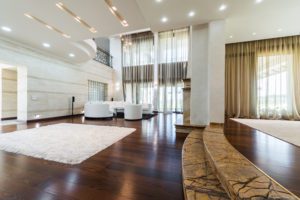Whether they’re installed in a home or an office, the visual appeal of hardwood flooring is tough to beat. Its natural aesthetic makes it compatible with nearly any decor style, while the warm, soft feel means it’s easier on your feet. However, if you’re thinking about installing wood floors, you still need to decide between a couple of options – engineered hardwood vs. solid hardwood flooring: which is better for your home?
If you are torn between these two options, check out our detailed comparison below to select the most practical option for your home.
What are Engineered Hardwood Floors?
Engineered hardwood floors are partially man-made and often feature distinct layers. One of these is a thin top layer and another is a solid hardwood bottom layer. These are bonded with veneers made of other wood products like plywood and MDF, and they are topped with a protective finishing coat.
Most engineered wood flooring features 5-7 layers of plywood or MDF, which are pressed together in different directions. Some engineered flooring may feature even more layers to enhance durability, but this typically comes at a higher cost.
What are Solid Hardwood Floors?
A solid hardwood floor, as the name implies, is constructed from planks that are all made from the same timber species. Solid hardwood flooring planks are usually about .75 inches thick, but the width is anywhere between 2.5 inches and 5 inches.
Depending on your source, solid hardwood flooring can be made of either unfinished or prefinished planks. Unfinished planks generally require sanding, sealing, and staining, while prefinished planks come ready to install. Solid hardwood flooring planks feature a tongue and groove profile, which allows them to easily and tightly interlock to prevent moisture spaces.
Engineered Hardwood vs. Solid Hardwood Flooring
Although they look pretty similar, engineered hardwood flooring and solid hardwood flooring differ in a few significant ways.
Construction and Color Variety
The primary difference between engineered and solid hardwood floors lies in their construction. While the former is made up of both solid wood and multiple layers of plywood, the latter is generally a plank made from one kind of natural wood that can be either finished or unfinished.
Engineered hardwood floors feature wider, slightly beveled floorboards, while solid floorboards are typically narrow and have tight seams between them. Moreover, solid wood floors sound and feel solid, while engineered options often sound hollow.
In terms of appearance, solid wood floors offer a wide variety of colors and grains, ranging from dark brown woods, like hickory, to lighter shades and even gray woods, like walnut and maple. Engineered hardwood floors, on the other hand, may have limited color options since the color range often depends on the manufacturer’s line of hardwood products.
Lifespan
Because it can be refinished multiple times, a solid wood floor lasts longer than its engineered variant. With proper maintenance, solid wood can last for up to 80 years, while engineered wood can only last up to 50 years. Either way, both options are pretty durable and have quite a long lifespan.
Water Resistance
As noted, engineered floorboards often feature multiple layers of plywood or MDF that are pressed together in different directions. The multiple layers and the way that they are positioned prevents warping and splitting. This makes engineered hardwood floors more water-resistant and better-suited for installation against concrete. Solid wood floors, on the other hand, will warp, rot, and even split when installed in moisture-prone areas.
Cleaning and Maintenance
Generally, all hardwood floors require regular cleaning and maintenance to keep them in good condition. In addition to sweeping, vacuuming and occasionally mopping them, it is recommended that you sand and seal your floors once a year to maintain their beautiful natural aesthetic. However, it is also important to note that you can only refinish engineered hardwood floors once or twice because repetitive refinishing will exhaust the solid hardwood layer.
Engineered Hardwood vs. Solid Hardwood Flooring: Which is Better for Your Home?
Both engineered and solid hardwood floors have their pros and cons, so your personal preference is really the biggest factor when deciding which kind to install. If you want to choose from a variety of colors, solid hardwood floors are the way to go. However, if durability is your biggest priority, engineered hardwood floors are ideal. Still, torn between engineered vs. solid hardwood floors?
Get in touch with us today, and let our team help.

